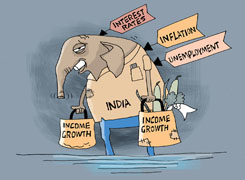Ramalingam Kalirajan |10874 Answers |Ask -Follow
Mutual Funds, Financial Planning Expert - Answered on May 23, 2024
He has an MBA in finance from the University of Madras and is a certified financial planner.
He is the director and chief financial planner at Holistic Investment, a Chennai-based firm that offers financial planning and wealth management advice.... more

I am 28 years old ,and i have an outstanding personal loan of 13.5 lacs, iam earning 10.3 lacs a year, I have invested in various mfs and my current value of assets are around 18.5 lacs, iam getting good returns on my investments (average rate of 15%), my question is should I close my loan or continue paying emi of 30k per month? .I have been advised to let my investments grow and keep paying the emis, i might get married within 2 years and was thinking of becoming loan free before getting married.
Assessing Your Financial Situation
Current Income and Loan Status
You earn Rs. 10.3 lakhs annually and have an outstanding personal loan of Rs. 13.5 lakhs. Your EMI is Rs. 30,000 per month. Your current investments total Rs. 18.5 lakhs with an average return of 15%.
Upcoming Life Events
You are considering getting married within the next two years. Being debt-free before marriage can provide financial stability and peace of mind.
Analyzing Loan Repayment vs. Investment Growth
Investment Returns vs. Loan Interest Rate
Your investments are yielding an average return of 15%. Compare this with the interest rate on your personal loan. If your loan interest rate is lower than your investment returns, it might be beneficial to let your investments grow.
Opportunity Cost
Continuing to invest instead of paying off the loan means your money can potentially grow more. Calculate the opportunity cost of prepaying the loan versus continuing with your investments.
Pros and Cons of Paying Off the Loan
Benefits of Closing the Loan
Debt-Free Status: Being loan-free before marriage provides financial security.
Reduced Monthly Outflow: Eliminating the Rs. 30,000 EMI can free up funds for other uses.
Drawbacks of Closing the Loan
Reduced Investment Growth: Using your investments to pay off the loan may limit your potential investment growth.
Opportunity Cost: You might miss out on higher returns from your current investments.
Pros and Cons of Continuing Loan Repayments
Benefits of Continuing EMIs
Investment Growth: Your investments continue to grow at a higher rate.
Financial Flexibility: Maintaining liquidity can help with future expenses or emergencies.
Drawbacks of Continuing EMIs
Interest Payment: Continued EMIs mean ongoing interest payments, increasing the total cost of the loan.
Financial Burden: The EMI of Rs. 30,000 per month is a significant outflow.
Making an Informed Decision
Evaluate the Interest Rate
Compare your loan’s interest rate with the returns on your investments. If your investment returns significantly exceed the loan interest rate, it might be better to continue investing.
Consider Your Financial Goals
If becoming debt-free before marriage is a priority, paying off the loan might provide peace of mind. Consider the emotional and financial benefits of being debt-free.
Impact on Liquidity
Ensure that paying off the loan doesn’t compromise your liquidity. Maintain an emergency fund to cover unexpected expenses.
Professional Guidance
Certified Financial Planner (CFP)
Consult a Certified Financial Planner to get personalized advice. They can help you weigh the pros and cons based on your specific financial situation.
Conclusion
Balancing your loan repayment with your investment growth requires careful consideration. Compare the interest rates, evaluate your financial goals, and consult a professional if needed. Making an informed decision will help you achieve financial stability and peace of mind.
Best Regards,
K. Ramalingam, MBA, CFP,
Chief Financial Planner,
www.holisticinvestment.in
You may like to see similar questions and answers below
Ramalingam Kalirajan |10874 Answers |Ask -Follow
Mutual Funds, Financial Planning Expert - Answered on May 13, 2024
Ramalingam Kalirajan |10874 Answers |Ask -Follow
Mutual Funds, Financial Planning Expert - Answered on Jun 04, 2025
Naveenn Kummar |233 Answers |Ask -Follow
Financial Planner, MF, Insurance Expert - Answered on Sep 04, 2025
Ramalingam Kalirajan |10874 Answers |Ask -Follow
Mutual Funds, Financial Planning Expert - Answered on Oct 10, 2025
Mayank Chandel |2569 Answers |Ask -Follow
IIT-JEE, NEET-UG, SAT, CLAT, CA, CS Exam Expert - Answered on Dec 08, 2025
Mayank Chandel |2569 Answers |Ask -Follow
IIT-JEE, NEET-UG, SAT, CLAT, CA, CS Exam Expert - Answered on Dec 08, 2025

Mayank Chandel |2569 Answers |Ask -Follow
IIT-JEE, NEET-UG, SAT, CLAT, CA, CS Exam Expert - Answered on Dec 08, 2025
Mayank Chandel |2569 Answers |Ask -Follow
IIT-JEE, NEET-UG, SAT, CLAT, CA, CS Exam Expert - Answered on Dec 08, 2025
Mayank Chandel |2569 Answers |Ask -Follow
IIT-JEE, NEET-UG, SAT, CLAT, CA, CS Exam Expert - Answered on Dec 08, 2025
Anu Krishna |1746 Answers |Ask -Follow
Relationships Expert, Mind Coach - Answered on Dec 08, 2025
Ramalingam Kalirajan |10874 Answers |Ask -Follow
Mutual Funds, Financial Planning Expert - Answered on Dec 08, 2025
Samraat Jadhav |2499 Answers |Ask -Follow
Stock Market Expert - Answered on Dec 08, 2025
Ramalingam Kalirajan |10874 Answers |Ask -Follow
Mutual Funds, Financial Planning Expert - Answered on Dec 08, 2025
Radheshyam Zanwar |6737 Answers |Ask -Follow
MHT-CET, IIT-JEE, NEET-UG Expert - Answered on Dec 08, 2025























